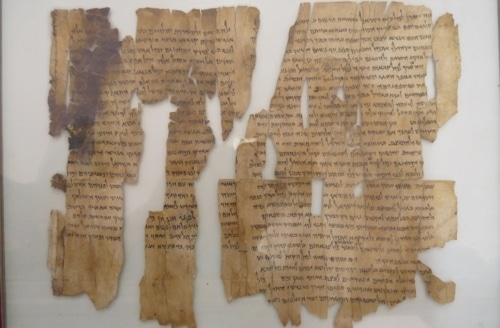For everything that was written in the past was written to teach us, so that through the endurance taught in the Scriptures and the encouragement they provide we might have hope.
Romans 15:4 NIV
As Christians, sometimes we are guilty of neglecting the Old Testament, thinking it is not particularly relevant to Christians under the new covenant. But it actually has great value for us as believers.
History has something to teach us if we will only take the time to learn its lessons. And that is especially true of the Old Testament. Paul tells us here that everything that was written in the past, the Old Testament, was written to teach us.
We are all familiar with the stories of Noah, Abraham, Joseph, Moses, Joshua, and David. They are heroes of the faith who rose from humble origins to be used mightily by God. But how many know of Eleazar, the son of Dodai? His story is told in 2 Samuel 23:9-10. He was a warrior in David’s army. Once in a battle, the Israelite army retreated, except for Eleazar. He stood his ground, and the Lord used him to bring about a great victory.
Eleazar’s greatness was not because he was a mighty warrior. But because he stood his ground, God used him in a mighty way. We can learn from him and many more whose stories we find in the Old Testament. Stories that can encourage us to stand our ground and be used by God. Even when we are standing alone and it seems hopeless.


I think what he is saying is that a lot of the teachings from the Old Testament are obsolete now. For example sacrificing animals for atonement for our sins. We no longer have to do that once Jesus came and his blood was an atonement for our sins. But indeed it is all good to know. So I get what you are saying as well. I always like reading Isaiah 53 when he explains the coming of the Lord. Plus I like the stories as well. I’m glad I wasn’t born during that time though.
Rather than being obsolete, they have found their fulfillment in Jesus and what he did. The priesthood, temple, and sacrifices all looked forward to Jesus.
Absolutely.
Some instructions/commands persist [still apply] whereas others have past their validity date. Thus dispensational chapters should be read in context of where we are in Church Age, and some of the OT edicts no longer apply. Context matters. Literal/fundamental reading of the OT persuades some Young-Earth students to conclude Creation/Earth to be 4,000 years old. Ditto Theistic Evolution [ISBN 9781433552861] may be God’s deliberate design. Likewise the Holy Bible consisting of 66 books and many authors represents a spectrum of historical/anagorical/poetry/instruction and has old/current/future streams; we would be well to recognise those different strata and not blindly treat every book in the same category despite each being Spirit-Breathed and inspired. Mature learning should progress beyond milk, but note I am NOT suggesting an anything-goes relativist exergesis.
The Bible does indeed include many genres of literature. And it is important to understand them in order to fully understand what the Bible is teaching. But all Scripture is given by inspiration of God and is still profitable for us. None of it is past its expiration date. That does not mean that we are under the Law. But the Law and Prophets need to be understood now in the light of Jesus’ fulfillment of them. And that often means that interpreting them in a literal physical fashion leads us to the wrong conclusions. We need to “rightly divide the word of God.”
The OT instructs building a tabernacle, making sacrifices, not boiling a kid in its mother’s milk, killing everything in Canaan, and the hierarchical priestly system [all N/A now]. In NT and church age [dispensation] we are freed from earlier commandments [well 2 stand out but probably the other 8 still apply], and we can approach God [Jesus] directly. We have Faith in our Lord, and Hope “Now faith is confidence in what we hope for and assurance about what we do not see. 2 This is what the ancients were commended for” [Heb 11]. Over time mankind has summarised series of creeds but Sola Scriptura underpins orthodox beliefs.
I’m sorry, but I do not understand your point here. What is it you are trying to say?